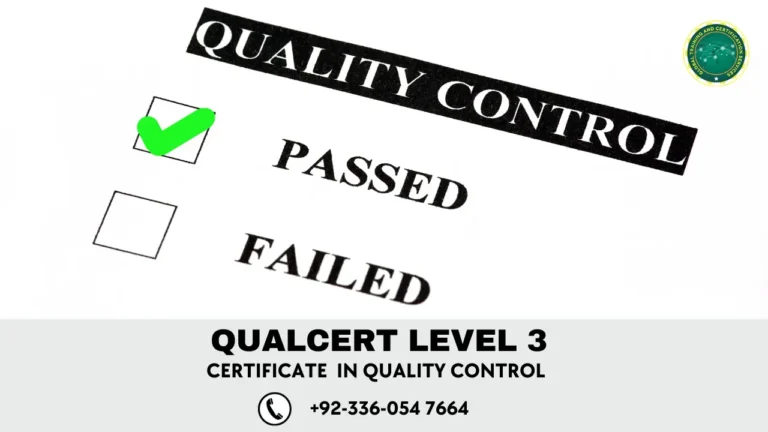
Level 2 Diploma in Quality Control (QC)
“Empowering Futures through Excellence in Quality Control – Level 1”
Are you ready to take your career to new heights? Dreaming of a future filled with exciting opportunities, impressive job titles, and a steady climb up the corporate ladder? Look no further – the Level 2 Diploma in Quality Control is your passport to success!
Why Choose Level 2 Diploma in Quality Control (QC)
- Industry Relevance: The Level 2 Diploma in QC is tailored to meet the demands of modern industries. It covers a broad spectrum of quality control concepts and techniques applicable to manufacturing, healthcare, software development, and many other sectors, making it a versatile qualification.
- Career Opportunities: Quality control is a fundamental aspect of any business. With this diploma, you’ll open doors to a wide range of career opportunities, including quality control technician, inspector, quality assurance analyst, or quality manager, to name a few. The skills you gain are highly transferrable across industries, enhancing your employability.
- Skill Development: The curriculum of this diploma program is carefully crafted to provide comprehensive training in quality control methodologies, statistical analysis, root cause analysis, and quality management systems. You’ll acquire practical skills that can be immediately applied in the workplace.
- Quality Improvement: By enrolling in this program, you’ll not only learn how to maintain standards but also how to improve them. Understanding the principles of QC will enable you to identify and rectify inefficiencies, reduce defects, and enhance product or service quality.
- Professional Recognition: Completing the Level 2 Diploma in QC demonstrates your commitment to excellence in quality control. It can be a valuable addition to your resume and may increase your chances of advancement within your current organization or secure new employment opportunities.
Your Future Awaits – Enroll Today!
The Level 2 Diploma in Quality Control (QC) is a vocational qualification designed to provide individuals with a foundational understanding of quality control principles and practices. This diploma program is typically offered by educational institutions, vocational training centers, or online platforms and is geared towards students and professionals who wish to develop their skills in quality control within various industries.
The Level 2 Diploma in Quality Control (QC) offers a range of benefits to individuals looking to pursue a career in quality control or enhance their existing skills and knowledge in this field. Here are some of the key benefits:
- Industry-Relevant Skills: This diploma equips you with practical skills and knowledge that are directly applicable to various industries, ensuring you are well-prepared to work in quality control roles across different sectors.
- Enhanced Career Opportunities: Having a Level 2 Diploma in QC on your resume can open doors to a wider range of job opportunities in quality assurance, inspection, and compliance roles. It can help you stand out to potential employers.
- Quality Assurance Expertise: You will gain a deep understanding of quality control principles and practices, enabling you to identify and rectify quality issues efficiently, ultimately contributing to product and service excellence.
- Improved Problem-Solving Skills: The diploma program often includes problem-solving techniques and tools that are essential in addressing quality challenges and improving processes within an organization.
- Higher Earning Potential: With specialized knowledge and skills in quality control, you may be eligible for higher-paying positions and better career advancement opportunities within your industry.
- Quality Management: You’ll learn about quality management systems and how to implement them effectively. This knowledge can be valuable for those aspiring to lead quality improvement initiatives within their organizations.
- Regulatory Compliance: Many industries have strict quality and safety regulations. A Level 2 Diploma in QC can help you understand and navigate these regulations, ensuring products and processes comply with legal standards.
- Attention to Detail: Quality control requires a keen eye for detail, and this diploma program can help you develop and hone this crucial skill, which is highly sought after in many professions.
- Career Flexibility: The skills and knowledge acquired in a Level 2 Diploma in QC are transferable across industries, allowing you to explore various career paths or even switch industries if desired.
- Personal and Professional Growth: Pursuing this diploma demonstrates your commitment to personal and professional development. It can boost your confidence and self-esteem as you become more proficient in quality control practices.
- Contribution to Organizational Success: By ensuring the quality of products or services, you play a pivotal role in enhancing customer satisfaction and loyalty, which can lead to increased business success and profitability.
- Networking Opportunities: Enrolling in a diploma program often exposes you to a network of peers and professionals in the field, which can be invaluable for sharing insights, best practices, and potential job opportunities.
- Understanding of Quality Control Principles:
- Explain the fundamental principles and concepts of quality control.
- Identify the importance of quality control in various industries.
- Quality Control Techniques:
- Apply basic quality control techniques, including inspection, sampling, and statistical analysis.
- Demonstrate proficiency in using common quality control tools such as checklists, Pareto charts, and control charts.
- Quality Standards and Regulations:
- Understand national and international quality standards and regulations relevant to the industry.
- Interpret and apply quality standards to ensure compliance in the production process.
- Measurement and Metrology:
- Perform accurate measurements using various measuring instruments.
- Describe the principles of metrology and its role in quality control.
- Defect Identification and Analysis:
- Identify defects and deviations in products or processes.
- Analyze root causes of defects and propose corrective actions.
- Documentation and Record Keeping:
- Maintain accurate records of quality control activities.
- Create and manage quality control documentation.
- Communication and Reporting:
- Communicate quality control findings effectively with relevant stakeholders.
- Prepare quality control reports and documentation for review.
- Problem-Solving and Continuous Improvement:
- Apply problem-solving techniques to address quality issues.
- Participate in continuous improvement initiatives to enhance product or process quality.
- Teamwork and Collaboration:
- Collaborate with colleagues to ensure quality control processes are effectively implemented.
- Contribute to a positive and cooperative work environment.
- Health and Safety Compliance:
- Adhere to health and safety regulations while conducting quality control activities.
- Identify potential safety hazards and take appropriate precautions.
- Ethical and Professional Conduct:
- Demonstrate ethical behavior and professionalism in all quality control activities.
- Uphold confidentiality and integrity in handling sensitive information.
- Environmental Responsibility:
- Recognize the importance of environmentally responsible practices in quality control.
- Follow guidelines for minimizing environmental impact in quality control processes.
- Customer Focus:
- Understand the importance of meeting customer expectations in quality control.
- Prioritize customer satisfaction and feedback in quality improvement efforts.
- Resource Management:
- Optimize the use of resources (e.g., materials, equipment, manpower) in quality control processes.
- Identify opportunities for resource efficiency and cost reduction.
- Adaptability and Innovation:
- Adapt to changes in technology, processes, and industry trends.
- Propose innovative solutions for enhancing quality control practices.
The Level 2 Diploma in Quality Control (QC) is a valuable qualification that offers numerous benefits to individuals and organizations alike. Here are some compelling reasons why pursuing this diploma can be a wise choice:
- Foundation in Quality Control: The Level 2 Diploma in QC provides a solid foundation in quality control principles and practices. It equips individuals with essential knowledge and skills required to maintain and improve product and service quality.
- Career Advancement: This diploma opens up opportunities for career advancement in various industries, including manufacturing, healthcare, logistics, and more. Quality control professionals are in high demand, and having this qualification can make you a more attractive candidate for job openings and promotions.
- Quality Assurance: Quality control is an integral part of quality assurance. By earning this diploma, you can contribute to ensuring that products and services meet or exceed industry standards and customer expectations. This not only benefits your organization but also enhances your professional reputation.
- Problem-Solving Skills: The diploma program emphasizes problem-solving and critical thinking. Quality control professionals are often tasked with identifying and resolving issues related to product defects or service deficiencies. The skills you acquire will make you adept at finding solutions to complex problems.
- Increased Employability: Employers value candidates with a strong understanding of quality control processes. Holding a Level 2 Diploma in QC can make you stand out in a competitive job market and increase your employability.
- Cost Savings: Effective quality control can lead to cost savings for organizations. By reducing defects and ensuring products meet quality standards, businesses can minimize waste and improve efficiency. As a QC professional, you can contribute to these cost-saving efforts.
- Global Recognition: Quality control principles are recognized and applied globally. Having this diploma not only demonstrates your expertise but also makes it easier to work in various countries and industries.
- Continuous Improvement: The diploma program encourages a mindset of continuous improvement. Quality control professionals are often at the forefront of identifying areas for enhancement, which can lead to better processes, products, and services.
- Compliance and Regulations: Many industries have strict regulations and standards that must be adhered to. A Level 2 Diploma in QC equips you with the knowledge to ensure compliance, reducing the risk of legal issues and fines for your organization.
- Personal Growth: Pursuing this diploma is not just about professional development; it’s also an opportunity for personal growth. You’ll gain confidence in your abilities, enhance your problem-solving skills, and develop a keen eye for detail.
The Level 2 Diploma in Quality Control covers a wide range of topics and practical skills to ensure participants are well-prepared for quality control roles in diverse industries. The course contents include:
Module 1: Advanced Quality Control Principles
- In-depth exploration of quality control principles, philosophies, and methodologies.
- Understanding the role of quality control in enhancing product and service quality.
- Historical perspectives and the evolution of quality control concepts.
Module 2: Quality Control Tools and Techniques
- Advanced statistical process control (SPC) techniques for monitoring and improving processes.
- Comprehensive coverage of quality control tools such as control charts, scatter plots, and Pareto analysis.
- Root cause analysis (RCA) methodologies for addressing complex quality issues.
Module 3: Quality Standards and Regulations
- In-depth study of industry-specific quality standards and regulations (e.g., ISO 9001, AS9100).
- Compliance management and audit practices to ensure adherence to quality standards.
- Navigating regulatory requirements in highly regulated industries.
Module 4: Advanced Inspection and Testing Methods
- Advanced quality inspection techniques and procedures, including non-destructive testing.
- Sampling methodologies, including attribute sampling and variable sampling.
- Precision measurement and calibration processes for specialized equipment.
Module 5: Quality Management Systems (QMS) and Six Sigma
- In-depth understanding of quality management systems, including Six Sigma and Lean principles.
- DMAIC (Define, Measure, Analyze, Improve, Control) methodology for problem-solving and process improvement.
- Total Quality Management (TQM) and its application in various industries.
Module 6: Statistical Analysis in Quality Control
- Advanced statistical analysis techniques for data-driven decision-making.
- Hypothesis testing, regression analysis, and design of experiments (DOE) for process optimization.
- Utilizing statistical software applications for quality control.
Module 7: Quality Control Documentation and Reporting
- Advanced techniques for maintaining comprehensive quality control records.
- Advanced audit planning and execution, including internal and external audits.
- Effective communication and reporting of quality control findings to stakeholders.
Module 8: Safety Integration and Risk Management
- In-depth exploration of the interplay between safety and quality in various industries.
- Risk assessment methodologies and safety considerations in quality control.
- Ensuring safe quality control practices in high-risk environments.
Module 9: Leadership in Quality Control
- Developing leadership skills to lead quality control teams and initiatives.
- Creating a culture of continuous improvement and quality excellence within organizations.
- Ethical considerations in quality control leadership.
Module 10: Capstone Project
- Application of advanced quality control principles and practices to real-world scenarios.
- Independent or group capstone projects that demonstrate mastery of quality control concepts.
- Presentation and evaluation of capstone projects.
The Level 2 Diploma in Quality Control (QC) is designed for individuals who are interested in pursuing a career in quality control and assurance within various industries. This course is specifically tailored to meet the needs of the following groups:
- Entry-Level Professionals: If you are just starting your career and aspire to work in quality control, this course provides you with a foundational understanding of QC principles and practices.
- Quality Control Technicians: Current QC technicians looking to enhance their knowledge and skills in the field will benefit from this program, as it covers more advanced topics and techniques.
- Manufacturing Personnel: Individuals working in manufacturing, production, or assembly roles can improve their ability to contribute to product quality and process improvement through this course.
- Quality Assurance Personnel: Quality assurance professionals, including QA analysts and inspectors, can use this course to deepen their understanding of quality control methods and tools.
- Supervisors and Managers: Those in supervisory or managerial positions who oversee quality control operations can gain valuable insights to improve efficiency and maintain high product standards.
- Career Changers: If you are considering a career change into the field of quality control and assurance, this course will provide you with the essential knowledge and skills to make a successful transition.
- Small Business Owners: Owners or managers of small businesses that involve manufacturing or production can benefit from this course to implement effective quality control measures within their operations.
- Anyone Interested in Quality: This course is open to anyone who has a general interest in understanding quality control principles, even if it’s not directly related to their current profession or career goals.
Entry Requirements for the Level 2 Diploma in Quality Control (QC) Course
To ensure that participants can effectively engage with and benefit from the Level 1 Diploma in Quality Control (QC) course, we have established the following entry requirements:
- Educational Background: Typically, participants should have a high school diploma or its equivalent (such as a GED). Some programs may require a minimum level of education, such as completion of secondary education, to ensure participants have basic academic skills.
- Language Proficiency: Proficiency in the language of instruction (usually English) is essential to comprehend complex course materials, actively participate in discussions, and complete written assignments.
- Age Requirement: Participants must be at least 18 years of age to enroll in this course.
- Industry Experience: While not always required, some programs may prefer or recommend that participants have some prior industry experience related to the field they intend to study. This can provide valuable context for understanding quality control principles.
- Level 1 QC Diploma (Recommended): While not mandatory, completion of a Level 1 QC diploma or equivalent foundational training is highly recommended.
To take admission in Based Computer course, Please visit our institute
Global Training and Certification Services
1st Floor, Al-Qaim Plaza, Mundiyal Chowk, Talagang
For any query or detailed information please call us on
+92-336-054 7664
For WhatsApp Please







